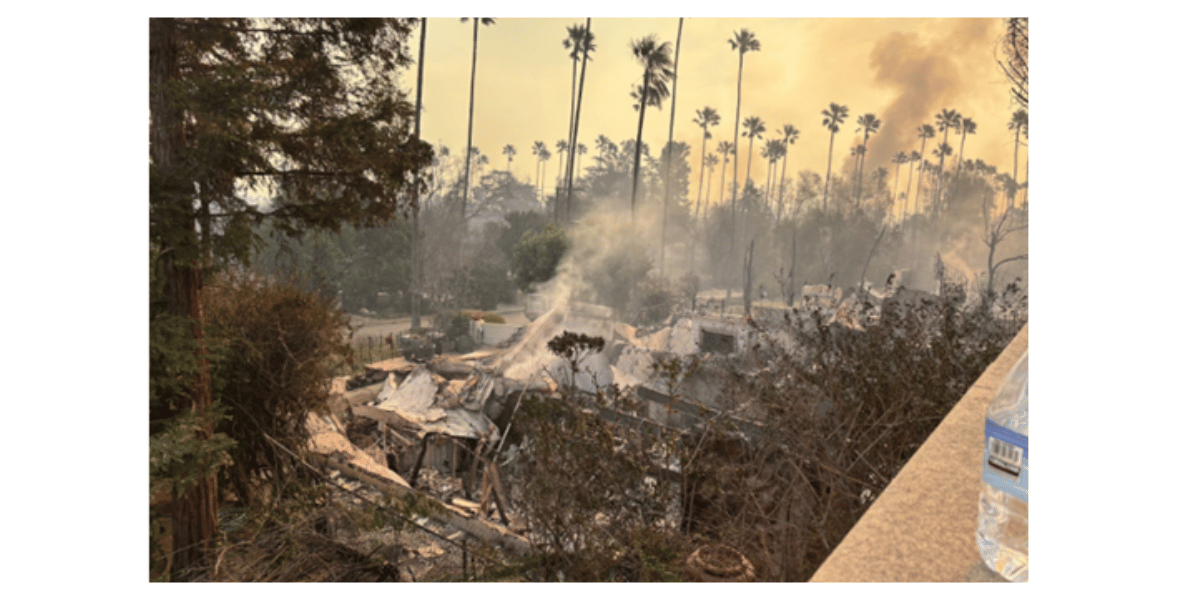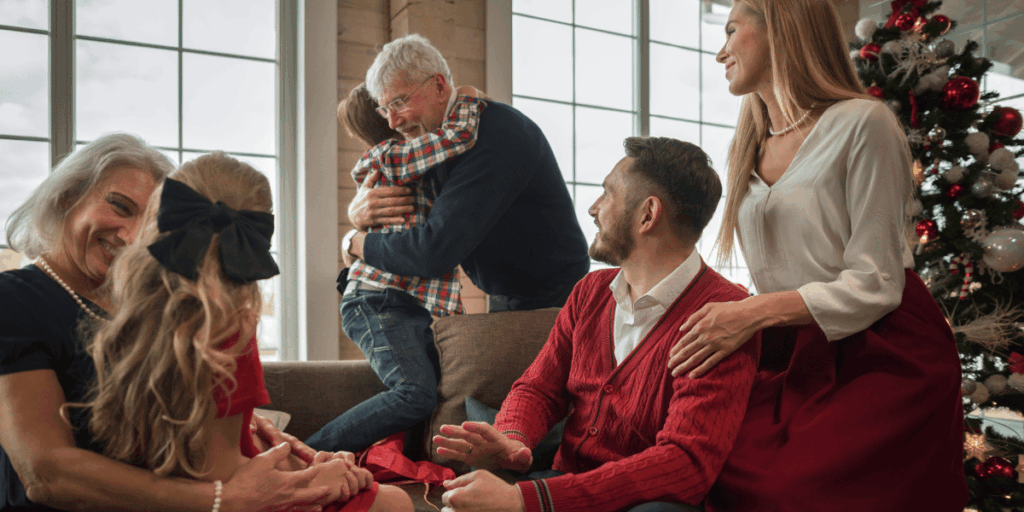Lessons from the LA Fires on Persevering through Pain
Like many of you, I have loved ones who are deeply impacted by the Los Angeles fires and the ongoing aftermath. Some close friends live just blocks from the Eaton Fire flashpoint and 90% of their Altadena neighborhood is gone. As of this writing, their house is still there … and so they and their kids are still there, with no water or electrical service, trying to protect their home from constant wind-borne embers, flaring hot spots, and roving looters.
This picture is from their back windows. Most of the neighborhood looks like this.
They know they are among the extremely fortunate few. Still, they too are in pain, getting very little sleep, grieving the loss of a community and way of life, and wondering what tomorrow will bring. Yet here’s what one of them recently posted on social media: “Amid the grief and loss, we are already seeing signs of new sprouts of life. It’s exciting! And terrifying! But we think God has put us here for a mysterious purpose and we are excited to say ‘YES’ along with all of you who want to join us on this journey.”
It honestly made me want to cry. I want to have this kind of perspective … one that perseveres through hard things with grace. I’ll bet you do, too.
Building Perseverance
This leads to an important question: How do we build—and help our kids build—perseverance in the first place? Not just when a physical fire gets out of control, but when our friend group, school life, job, church, health, or marriage feels like it’s burning, too.
This is a key question we are studying in our latest research project on mental health, and it’s WAY too big of a topic to cover fully in a short blog. (It will probably be a whole chapter in our next book!) But in our research interviews, I see three key habits that will get us started.
Habit #1: Practice healthy coping
When I was going through a challenging book deadline, cancer treatments, massive financial stress due to Covid shutdowns, and some significant emotional trauma, guess what my coping mechanism was?
Food.
Guess whether it helped or not?
I’m sure you know the answer. I gained pounds, not perseverance.
All of us have healthy and unhealthy coping mechanisms, whether we realize it or not. This sounds ridiculously simple, but it is also ridiculously important: If we want to build our “you-can-do-this” muscles in hardship, it means we have to figure out what our coping mechanisms are in the moment. Then we feed the healthy ones (box breathing, praying, walking, or calling a friend), and prune the unhealthy ones (sugar, drinking, sarcasm, rage-texting, or doomscrolling).
The unhealthy habits sabotage perseverance. The healthy ones build it!
I know not every reader has the same beliefs, but followers of Jesus know that ultimately, we have to turn to Jesus Himself rather than anything else we are tempted to lean on.
Who or what do you turn to? Healthy support mechanisms for the tested soul should start with things like prayer, but they don’t have to end there. For example, in our recent interviews with Christian first responders, multiple police officers and firefighters told us they had to choose to build exercise into their routine. They were busy, tired, stretched, and traumatized, yet when they went for a run, with praise music on their playlist, God fortified them.
What fortifies you? What fortifies your kids? Take a moment to think about that—and help your kids think about it—and write it down in the notes on a phone or journal. Then ask God how to build that into the day—especially when you’re tempted to turn to something else.
Habit #2: Pursue social support—of a specific kind
Mounds of evidence shows that creating community and connection is vitally important for building a thriving life. It helps with everything. When you have a supportive community, you are less likely to snap at your kids (yes, it’s true!), more likely to have better physical and mental health and do better in school, and (if your supportive community is supportive of marriage) less likely to get divorced.
What I’m curious about now is: what kind of social support is most impactful for helping us push through life’s challenges? We can guess that having friends who will encourage us, and who are good listeners matters.
But what we are finding in the research so far is much, much more specific: To truly come through trauma and hardship well, these four variables matter:
- You need someone you can talk to
- You expect they will ‘get’ your troubles
- You expect them to be vulnerable with you
- You are vulnerable with them
The pattern applies to everyone and every issue, but let’s suppose you are caring for a spouse whose mental health has dramatically declined. Your once-loving spouse now screams out their needs … or doesn’t even remember you. To process it all, you need to talk to someone—but not just anyone. Your friends from church may sympathize, but they won’t get it. They don’t know the demands of caregiving while someone you love slowly slips away. So, you need to talk to another caregiver who intimately understands.
And here’s the key: You need to be able to be vulnerable about what you are really going through—and you are most likely to be vulnerable if you expect the other person will be, too.
So that’s the formula that appears most likely to work: Reach out to the person who can relate—who you think and hope might be willing to really open their heart—and then take the risk to open yours. Build the connection that will be life-giving for both of you.
Habit #3: Find purpose from pain
In research interviews four our latest project, we asked people if they would share their difficult mental health journeys. Over and over they said: “Of course. If it will help people who are going through what I went through, I’m happy to help.”
The people who persevere see the light at the end of the tunnel. The light is often not the end of the pain (because sometimes the pain is ongoing). But seeing a purpose for how the pain might be used makes a difference. Maybe it can help someone else. Maybe it’s to grow them. Maybe it’s to share about the goodness of God even in the heartache.
Notice our friend’s comment as he sits in his Altadena home, protecting it from flareups and looters, in a community filled by other grieving and scared people. “We are already seeing signs of new sprouts of life. . . we think God has put us here for a mysterious purpose and we are excited to say ‘YES.’”
We have to have hope in order to persevere through pain, whether it is in a challenging marriage or a challenging job, a chronic health issue or a long-term financial hardship. We never choose these challenges, but being open to how God can use them, helps us to not give up.
If you are interested in having Shaunti bring research-based strategies, practical wisdom and biblical principles to your next event, please contact Nicole Owens at [email protected].
On our podcast, I Wish You Could Hear This, Jeff and I offer proven steps to help you thrive in your life, faith and relationships. In other words, we’ll offer the practical help you’ve grown accustomed to right here in this blog space. You’ll take away specific steps that help you today. Listen, follow, and share with your friends on YouTube, Apple Podcasts, Spotify and other platforms.
Please note: This post may contain affiliate links. As an Amazon Associate we earn a small amount from qualifying purchases through these affiliate links. This doesn’t cost you anything, and helps us continue bringing you great content!







